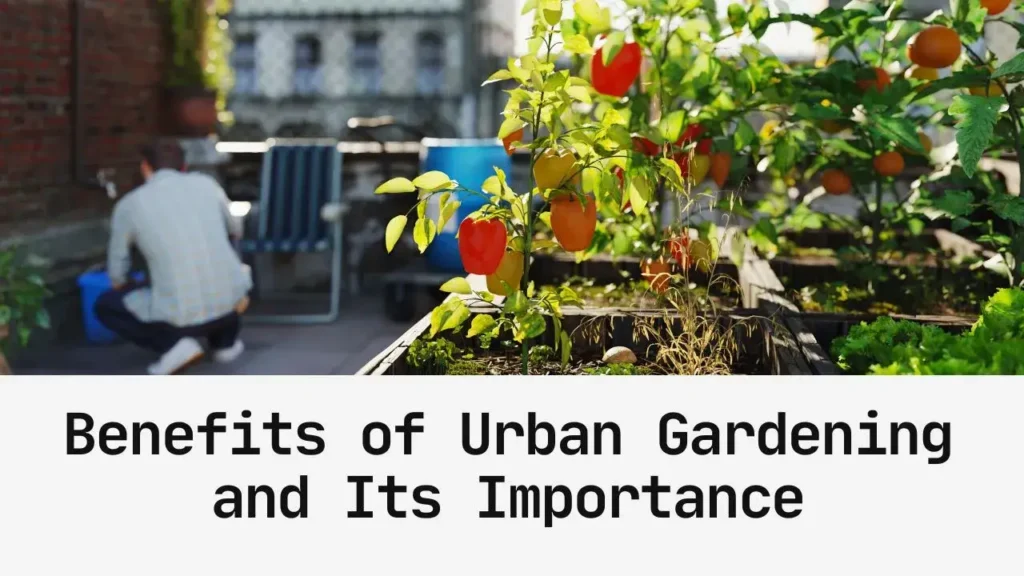Imagine a city not just composed of concrete and steel, but dotted with vibrant pockets of green. This is the vision that urban gardening brings to life. It’s the practice of cultivating plants, vegetables, or fruits in urban areas, transforming rooftops, balconies, and even vacant lots into flourishing ecosystems.
But urban gardening offers much more than visual transformation. It cultivates a multitude of benefits for individuals, communities, and the environment, making it a crucial practice for fostering a more sustainable and healthy future in our cities.
Benefits of Urban Gardening
Urban gardens aren’t just pleasing to the eye; they offer a wealth of advantages that can be categorized into personal, community, and environmental benefits.
Personal Benefits
For the individual gardener, the rewards are plentiful:
Access to fresh, healthy produce:
Imagine enjoying homegrown tomatoes bursting with flavor or crisp lettuce straight from your balcony container. Urban gardens allow you to cultivate your own nutritious food, reducing reliance on grocery stores and giving you control over the quality of your ingredients.
Improved mental and physical well-being:
Gardening is a great way to de-stress. The act of nurturing plants, getting your hands dirty in the soil, and witnessing the growth cycle can be incredibly calming and therapeutic. Additionally, the physical activity involved in gardening provides exercise and improves overall fitness.
Learning experience:
Urban gardening is a journey of discovery. You’ll gain valuable knowledge about food systems, plant needs, and sustainable practices. Whether you’re a seasoned gardener or a curious beginner, there’s always something new to learn and appreciate about the natural world.
Community Benefits
The positive impact of urban gardens extends far beyond the individual. They become vibrant hubs that foster a sense of connection and shared purpose within communities:
Increased social interaction and connection:
Community gardens provide a space for people of all ages and backgrounds to gather. Working alongside neighbors to cultivate a shared space promotes communication, collaboration and building strong social bonds.
Fostering a sense of community pride and ownership:
When residents participate in creating and maintaining a thriving urban garden, it instills a sense of ownership and pride in their neighborhood. This shared responsibility fosters a more cohesive and vibrant community spirit.
Improved access to fresh produce in food deserts:
Many urban areas, particularly low-income neighborhoods, lack access to supermarkets with fresh, affordable produce. Community gardens can help address this issue by providing residents with a source of healthy, locally grown food, promoting better nutrition and food security.
Environmental Benefits
The advantages of urban gardens extend far beyond the social sphere, playing a crucial role in creating a more sustainable and healthy environment for our cities:
Reduced carbon footprint:
Conventionally grown food often travels long distances before reaching our plates, generating significant carbon emissions through transportation and refrigeration. Urban gardens, on the other hand, drastically reduce these emissions by bringing food production closer to consumption.
Improved air and water quality:
Plants act as natural filters, absorbing pollutants from the air and improving overall air quality. Urban gardens can help manage storm water runoff, preventing soil erosion and filtering pollutants before they reach waterways.
Mitigation of urban heat island effect:
Cities tend to be several degrees hotter than surrounding areas due to the abundance of heat-absorbing concrete and asphalt. Urban gardens, with their vegetation and shaded areas, help to cool the surrounding environment, mitigating the urban heat island effect.
Creation of habitat for pollinators and other wildlife:
Urban gardens provide vital habitat for pollinators like bees and butterflies, which are crucial for a healthy ecosystem. They also attract other beneficial wildlife, promoting biodiversity within the city.
Importance of Urban Gardening
The benefits of urban gardening paint a compelling picture, but its importance goes even deeper. As our cities continue to grow, fostering sustainable practices becomes essential. Here’s why urban gardening is a crucial element in building a better future:
Growing urban populations and the need for sustainable food systems:
With a rising global population increasingly concentrated in urban areas, traditional agricultural methods are strained. Urban gardens offer an innovative solution, promoting local food production and reducing reliance on long-distance transportation systems.
Addressing food insecurity and promoting healthy eating habits:
Urban gardens can play a significant role in combating food insecurity, particularly in under served communities. By providing access to fresh, affordable produce, they encourage healthy eating habits and contribute to a fairer food system.
Creating a more resilient and liveable urban environment:
Urban gardens not only beautify our cities but also contribute to their overall resilience. They help manage stormwater runoff, mitigate the urban heat island effect, and improve air quality. This, in turn, creates a more comfortable and healthy living environment for city dwellers.
Conclusion:
Urban gardening is more than just a hobby; it’s a powerful tool for creating a healthier, more sustainable future for our cities. From nourishing individuals and communities to fostering a thriving environment, the benefits of urban gardening are undeniable.
Whether you have a spacious balcony or a small windowsill, there’s a way to get involved. Consider starting your own garden, joining a community garden project, or supporting local urban agriculture initiatives. Let’s turn our cities into vibrant green spaces, one flourishing garden at a time.
Limitations in Urban Gardening
While we’ve explored the numerous advantages of urban gardening, it’s important to acknowledge that it also comes with some challenges:
Limited space in urban environments:
Finding sufficient space for gardening can be a hurdle, especially in densely populated areas. However, with creativity and resourcefulness, there are solutions. Vertical gardening techniques, container gardening, and utilising rooftops or balconies can maximise even the most limited spaces.
Pests and diseases:
Like any garden, urban gardens can be susceptible to pests and diseases. Fortunately, there are organic pest control methods that are effective and environmentally friendly, such as using beneficial insects or companion planting.
